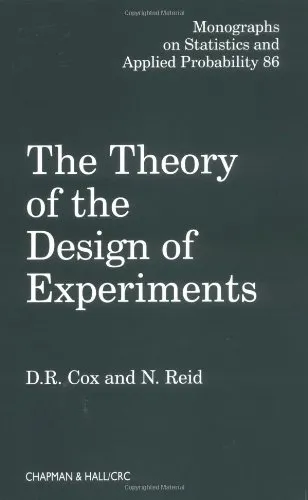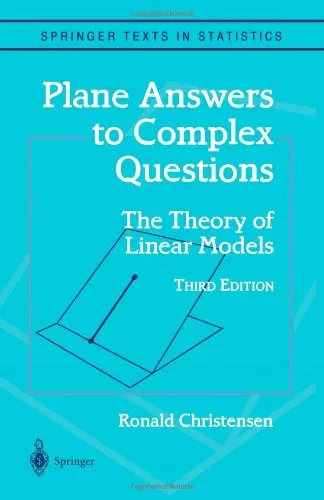The Theory of the Design of Experiments
4.5
بر اساس نظر کاربران

شما میتونید سوالاتتون در باره کتاب رو از هوش مصنوعیش بعد از ورود بپرسید
هر دانلود یا پرسش از هوش مصنوعی 2 امتیاز لازم دارد، برای بدست آوردن امتیاز رایگان، به صفحه ی راهنمای امتیازات سر بزنید و یک سری کار ارزشمند انجام بدینکتاب های مرتبط:
مقدمهای بر کتاب «The Theory of the Design of Experiments»
کتاب «The Theory of the Design of Experiments» یکی از آثار برجسته و تأثیرگذار در زمینه طراحی آزمایشات است که به قلم D.R. Cox و Nancy Reid نوشته شده است. این کتاب بهطور جامع به تئوریهای بنیادین و ارتباط آنها با روشهای عملی طراحی آزمایشات پرداخته و به مخاطبان دانش عمیقی در ارتباط با مدلهای آماری، تجزیه و تحلیل دادهها و اصول طراحی ارائه میدهد.
در این اثر، نویسندگان تلاش میکنند تا مفاهیم پیشرفتهای را که در قلب طراحی آزمایشات قرار دارند، به زبانی سادهتر برای پژوهشگران، دانشجویان و متخصصانی که در این حوزه فعالیت میکنند، توضیح دهند. این کتاب نهتنها به منابع آموزشی برای درک اصول اولیه محدود نمیشود، بلکه کاربردها و موارد عملی متعددی را نیز شامل میشود.
خلاصهای کامل از کتاب
این کتاب به چندین بخش کلیدی تقسیم شده است که هر کدام از آنها به بررسی موضوعات محوری مختلف در طراحی آزمایشات میپردازد.
- ***Introduction to Statistical Design***: در این بخش، نویسندگان مفاهیم پایهای طراحی آزمایشات آماری را معرفی کرده و اهمیت آن را در تحلیل دادهها و بهبود کارایی مطالعات توضیح میدهند.
- ***Randomization and Blocking***: این فصل به تکنیکهای تصادفیسازی و بلاکبندی پرداخته و نحوه کاهش تأثیر عوامل مخرب بر نتایج آزمایشها را شرح میدهد.
- ***Interaction Models and Multifactorial Designs***: در این بخش، مدلهای پیچیدهتر مانند مدلهای چندعاملی و نحوه تحلیل interactions بین عوامل توضیح داده شده است.
- ***Optimal Design***: مفاهیم طراحی بهینه و کارایی روشهای مختلف در دستیابی به بهترین نتایج از دیگر مواردی است که این کتاب بررسی میکند.
مهمترین دستاوردها
مطالعه و تسلط بر مفاهیم این کتاب مزایای بسیاری دارد. برخی از کلیدیترین موضوعات عبارتاند از:
- درک عمیق از مبانی تئوریک طراحی آزمایشها
- یادگیری نحوه استفاده از Randomization برای حذف خطاهای سیستماتیک
- مهارت در طراحی ساختارهای پیچیده آزمایشها بهویژه در مطالعات علمی و پزشکی
- یادگیری نحوه ارتباط مؤثر بین تئوری طراحی و کاربردهای عملی
نقلقولهای معروف از کتاب
در اینجا به برخی از برجستهترین نقلقولهای این کتاب اشاره میکنیم:
"Randomization is not just a technical tool; it represents an essential part of the logic of experimental design."
"The objective of blocking is to ensure that the comparison of treatments is not influenced by some extraneous variation."
چرا این کتاب اهمیت دارد؟
کتاب «The Theory of the Design of Experiments» نهتنها یک منبع علمی برای دانشجویان و پژوهشگران محسوب میشود، بلکه ابزاری کاربردی برای هر کسی است که در آزمایشها و مطالعات دادهمحور فعالیت میکند. از مطالعات زیستی تا تحقیقات مهندسی و علوم اجتماعی، این کتاب به عنوان یک راهنمای استاندارد جهانی شناخته میشود. دانش ارائه شده در این کتاب به محققان کمک میکند تا آزمایشات خود را نهتنها دقیقتر طراحی کنند، بلکه بتوانند نتایج قابل اعتماد و معناداری کسب کنند.
Introduction to "The Theory of the Design of Experiments"
"The Theory of the Design of Experiments" by D.R. Cox and Nancy Reid is a comprehensive and authoritative text on the methodology and principles underlying the design of experiments. This book focuses on the careful planning and structuring of studies to extract meaningful insights from observations while considering practical and theoretical constraints. Aimed at statisticians, researchers, and applied scientists, this work provides a thoughtful exploration of how experiments can be designed to optimize information gain, reduce bias, and increase efficiency across diverse fields of application.
Since its publication, this book has been widely regarded as an essential resource for anyone engaged in statistical design and analysis, offering a clear exposition of fundamental concepts alongside illustrative examples. It delves deeply into both the theoretical and practical aspects of experimental design, ensuring readers gain not only conceptual understanding but also the ability to apply these principles in a wide array of real-world contexts. Whether you're a beginner or an experienced professional, "The Theory of the Design of Experiments" is sure to deepen your understanding of this critical area of study.
Detailed Summary of the Book
At its core, this book addresses the key question: how can experiments be constructed to yield the most reliable and useful results while minimizing confounding factors? It begins with the historical context surrounding the development of experimental design and progresses to cover essential topics such as randomization, replication, and factorial structures.
The authors emphasize the importance of clear objectives and carefully chosen measurement strategies, offering advice on balancing practical constraints—such as resources, time, or ethical considerations—with the need for unbiased and informative data. Detailed discussions include topics such as:
- The distinction between observational and experimental studies
- The role and importance of randomization
- Blocking and stratification to reduce variability
- Factorial and fractional factorial experiments
- Implementation challenges and practical considerations
Throughout the book, examples and case studies are incorporated to ground the theoretical principles in actual practice. These examples span multiple disciplines, illustrating the versatility of the design-of-experiments framework and its potential for solving complex real-world problems.
Key Takeaways
Readers of "The Theory of the Design of Experiments" will walk away with a clear understanding of the foundational principles in experimental design. Key takeaways include:
- The crucial role of randomization in controlling for hidden biases
- How replication ensures robust and repeatable results
- Strategies for reducing variability through blocking and stratification
- The power of factorial experiments for understanding interactions between factors
- The importance of integrating theoretical rigor with practical constraints
By grasping these principles, readers will be better equipped to design experiments that yield actionable and scientifically reliable insights regardless of their field of study.
Famous Quotes from the Book
Within "The Theory of the Design of Experiments," readers will encounter many insightful observations and thought-provoking statements. Here are some memorable quotes:
- "Randomization is not solely a technique but a guiding principle in experimental design."
- "Replication is not merely repetition; rather, it is the foundation from which experimental conclusions gain strength."
- "Every experiment involves a balance between idealized theoretical designs and practical feasibility."
- "The design of experiments is as much an art as it is a science—a continuous dialogue between creativity and constraints."
Why This Book Matters
"The Theory of the Design of Experiments" is not just another statistics textbook; it is a timeless guide for anyone seeking to conduct high-quality, reliable, and impactful research. Its importance lies in its ability to bridge the gap between rigorous mathematical statistics and the often-messy reality of applied research.
Designed to accommodate readers from diverse professional backgrounds, the book provides tools and frameworks that can be adapted to various scientific fields, including agriculture, engineering, medicine, psychology, and social sciences. It brings special relevance in today's era of evidence-based practice and data-driven decision-making, where the design of experiments often underpins major scientific breakthroughs or policy decisions.
By focusing not only on technical methods but also on the principles and philosophy underlying experimental design, this book ensures that its teachings remain evergreen, applicable across generations of researchers and practitioners. It is a must-read for anyone aiming to achieve excellence in experimental research and statistical practice.
دانلود رایگان مستقیم
شما میتونید سوالاتتون در باره کتاب رو از هوش مصنوعیش بعد از ورود بپرسید
دسترسی به کتابها از طریق پلتفرمهای قانونی و کتابخانههای عمومی نه تنها از حقوق نویسندگان و ناشران حمایت میکند، بلکه به پایداری فرهنگ کتابخوانی نیز کمک میرساند. پیش از دانلود، لحظهای به بررسی این گزینهها فکر کنید.
این کتاب رو در پلتفرم های دیگه ببینید
WorldCat به شما کمک میکنه تا کتاب ها رو در کتابخانه های سراسر دنیا پیدا کنید
امتیازها، نظرات تخصصی و صحبت ها درباره کتاب را در Goodreads ببینید
کتابهای کمیاب یا دست دوم را در AbeBooks پیدا کنید و بخرید
1355
بازدید4.5
امتیاز0
نظر98%
رضایتنظرات:
4.5
بر اساس 0 نظر کاربران
Questions & Answers
Ask questions about this book or help others by answering
No questions yet. Be the first to ask!














